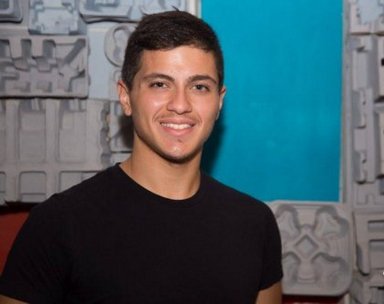Bijan Qutub

The first time I saw Bijan Qutub was on Euronews, on 29th August 2013. He was taking part in Bahrain Summer Festival. The first time, it was the images of his performance in Scheherazade (a Persian word meaning born in the city or child of the city), a classical ballet conceived by Diaghilev, as a project of the National Centre for Culture and Arts in Jordan where Bijan was born of a Jordanian and Spanish-Filipino mixed nationality couple. Today he is in New-York at the Joffrey Ballet School where, in Nijinsky’s words, working like a dog , he’s devoting his body and soul to dancing, a late but all the more transcendent passion.
It is six o’clock in the morning. Bijan is there, on the metro, sitting opposite two hundred mustachioed men. His eyelids still shut so as to see his only dream again and again. A dream which repeats itself night after night and which is coming true: being amongst the greatest ones, in the greatest ballets ever… New York? Lausanne? Milan? Vienna? Tokyo?
By dint of wanting the stars to dance, one gets lost a little. Is dreaming not short-lived madness? Is madness not a long-lasting dream ? He can feel his body changing, he can see the dancing steps again, he can no longer feel his muscles, dancing being an explosion of an own self, of commotion, dancing being a necessity, like others can write or sing. Bijan could be seen dancing everywhere, in the deserted streets of Amman, in the deserts of natural citrine, deserts of personal radiance, in order to accept his own power and regulate power exchanges. He could be seen with his arms wide open towards the world to give the illusion of a change of state, with his body and soul walking inside rings and circles or while trying to fly. That is why dancing is part of the best writers and the greatest artists’ lives, a feeling that the rightest words are escaping as they do in the most beautiful paintings and sculptures of the Iraqi artist named Ahmed Al Safi, a worthy representative of neo-expressionism. Who knows whether Bijan has not already started writing a diary in which he would be narrating the story of a flying character who is going off and on to tell in his turn about his steps to stay alive in an uncertain dawn.
And I am trying to find out what that young man’s trigger was. Because I did not mention it but, when he decided to force his body to dance, Bijan weighed two hundred and eighty-six pounds. I do not think that he saw himself as a Botero dancer, he already saw himself as a light shadow, so he had to lose weight, he did so and lost one hundred and thirty-two useless pounds. Dancing is not only a physical accomplishment, dancers are like poets, they pick a chaotic world’s most beautiful flowers to go back to the essentials. Not to forget that my role, our roles consist first of all in increasing beauty in a rather vile world.
See the dancer’s website online : http://bijanqutub.weebly.com/
Traduction : Patricia Massimo Massinon